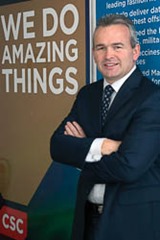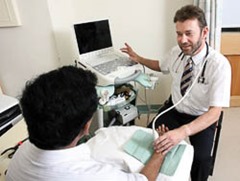Transforming health ICT
 Six months into his new role leading CSC’s healthcare business in Ireland, Rowan McGrath is hopeful we will witness the most significant transformation of Ireland’s health ICT infrastructure yet.
Six months into his new role leading CSC’s healthcare business in Ireland, Rowan McGrath is hopeful we will witness the most significant transformation of Ireland’s health ICT infrastructure yet.
My first real introduction to healthcare was when my son Tom was born by emergency caesarean section in 2000, almost seven weeks premature. At the time I was working as an IT consultant. The skill and expertise of the medical team in the theatre and later in the intensive care unit was amazing.
Looking into the incubator at my tiny newborn son, the paediatrician explained the complex steps the team had to go through to ensure a successful outcome for mother and baby. I tried to imagine the unbelievable job satisfaction in healthcare when things go so right and began to seriously question the value of my chosen career. The paediatrician had the good grace to comment: “Sure, but we would be nothing without the technology.”
The health system in Ireland is undergoing the most radical reform since the foundation of the State. Major transformation programmes include the reorganisation of our 48 public and voluntary hospitals into seven new hospital groups, the 32 local health offices consolidating into nine new community health organisations, 30 clinical programmes defining standard care pathways to be co-ordinated across all care settings – home, community and hospital – and a new finance operating model is being implemented which will deliver a single integrated finance management system for the first time.
All of this is happening at the same time as significant financial and human resources are being taken out of the system. The World Health Organization last year reported that Ireland suffered the largest reduction in spending on health, as a percentage of general government spending between 2008 and 2011, of the 53 countries analysed.
You would be right in thinking that any one of these programmes would be enough to be getting on with, but the fact is that they are all essential if we are to safely and affordably meet the demands being placed on our Health Service from a fast-growing population which is living longer and a rise in chronic diseases. The other fact is that integrated and co-ordinated care across all care settings cannot happen without appropriate ICT infrastructure.
Industry priorities
Five years ago, I chaired an ICT industry group which comprised thirty Irish-based ICT companies from multi-nationals to small innovative start-ups. We spent six months working at our own expense analysing the Irish health system, and making recommendations based on international best practice as to how ICT could help save lives, improve patient outcomes and reduce costs. We produced a report entitled ‘ICT’s role in Healthcare Transformation’.
Five years on, I think we are finally beginning to make progress as we see some of the recommendations reach implementation, which makes me hopeful for the future. The first two recommendations spoke about the need for leadership, so I welcome the recent appointment of Richard Corbridge as Ireland’s first Health Chief Information Officer. I understand from recent news coverage that Richard Corbridge will report directly to the HSE Director General, Tony O’Brien, which rightly positions the ICT function at the leadership table. The recent appointments of Minister Leo Varadkar and Secretary General Jim Breslin in the department are also very welcome. The industry group worked well with Jim Breslin when he was Assistant Secretary with responsibility for finance and ICT – suffice to say he really understands the issues involved.
Our third recommendation was that the HSE needs to triple its expenditure on ICT, in order to reach a median position of healthcare IT capability in the delivery of patient care when compared to other OECD countries. This objective was reiterated in the department’s eHealth strategy last year. It’s no secret that the HSE ICT department has suffered from chronic underinvestment, but here too we are beginning to see improvements with the overall ICT budget for 2015 increasing by about 10 per cent. Just another 290 per cent to go, but it’s a start.
Our fourth recommendation spoke of the need for the HSE to enhance their capacity to implement IT systems through a long term partnership with the ICT industry to leverage its expertise, capability and resources. We are seeing progress here as well, with the HSE recently launching a market engagement exercise called ‘Enabling Healthcare reform through strategic ICT and eHealth’.
Another element to the Government’s eHealth strategy is that we would expect to see a vital jobs dividend from any increased investment in health ICT. Not only will there be considerable effort required to upgrade the health ICT infrastructure across the country, but there will also be an opportunity for innovative Irish companies to partner with larger companies like CSC and prove the value of their solutions. As a company, we are acutely aware that we do not have a monopoly on good ideas and we will happily work with these local innovators to bring proven solutions to our clients across the globe.
So I genuinely think that things are going in the right direction and we are witnessing the beginning of a decade-long programme of ICT transformation that will support the most significant reform of our Health Service since the foundation of the State. I’m conscious that there are plenty of people who will say we’ve been here before, but I do think this time is different. Going back to our first recommendation about leadership, we now have the right people in the right jobs with the right authority to deliver the modern health system our citizens need and deserve.
About CSC
CSC has been operating in Ireland for the past 25 years and delivers IT outsourcing and managed services to clients including eBay, Diageo, Zurich and Primark. Our largest Irish client is the Health Service Executive (HSE) for whom we design, implement and support a wide range of hospital information systems, including patient administration, clinical management, laboratory information management and theatre management. We have been privileged to work with the HSE in the delivery of Ireland’s first national health ICT programme. The objective of this programme was to implement an integrated patient management system (IPMS) across the HSE’s public and voluntary hospitals. Globally, CSC employs 74,000 and reported revenue of $12.9 billion for the 12 months ended 3 October 2014. The company’s global HQ is in Falls Church, Virginia.
About Rowan McGrath
Rowan started his career as an army officer and served with the United Nations in Lebanon. Prior to joining CSC last June, he spent the previous 12 years working for BT Ireland, most recently as Head of Health and Public Sector. He holds a degree in electronic engineering from University College Galway and a Masters in Business from University College London. Married to Miriam, they have four children aged from seven to fourteen years.
 For further queries, Rowan can be contacted as follows:
For further queries, Rowan can be contacted as follows:
Unit 3, St John’s Court
Swords Road, Santry, Dublin 9
Mobile: +353 (0) 86 235 8523
Email: rmcgrath2@csc.com
Web: www.csc.com






